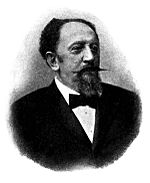About Karl Stoerk
- Karl Stoerk (German: Störk, 17 September 1832 – 13 September 1899) was an Austrian laryngologist who was a native of Ofen. He studied medicine at the Universities of Prague and Vienna, and received his doctorate in 1858.
- Afterwards he was an assistant to Ludwig Türck (1810–1868) in Vienna, where he practiced medicine for the remainder of his career.
- In 1891 Stoerk was appointed head of the laryngological clinic. Along with Leopold von Schrötter (1837–1908) and Johann Schnitzler (1835–1893), Stoerk was a catalyst in making Vienna a major center of laryngological research in the late 19th century.
- He demonstrated the possibility of applying remedies into the larynx and throat assisted by a laryngoscope.
- He also devised several medical instruments, including an early esophagoscope that was modification of the "Waldenburg esophagoscope".
- Stoerk's endoscopic device consisted of three telescopic tubes with a bendable mechanism.
Read more at Wikipedia
See Also
- Famous People's Birthdays on 17 September, Hungary
- Famous People's Birthdays in September, Hungary
- Famous People's Birthdays on 17 September, Austria
- Famous People's Birthdays in September, Austria
- Famous professor's Birthdays on 17 September, Hungary
- Famous professor's Birthdays in September, Hungary
- Famous laryngologist's Birthdays on 17 September, Hungary
- Famous laryngologist's Birthdays in September, Hungary
- Famous professor's Birthdays on 17 September, Austria
- Famous professor's Birthdays in September, Austria
- Famous laryngologist's Birthdays on 17 September, Austria
- Famous laryngologist's Birthdays in September, Austria


 Date of Birth:
Date of Birth:  Place of Birth: Buda, Budapest, Hungary
Place of Birth: Buda, Budapest, Hungary